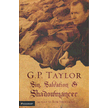I don't want to add to the controversy that has taken place or provoke people on either side to become angry, but I do want to know what the Bible says about topics like eternal judgement. There are a lot of books out there with people's opinions and "what ifs" and "maybes"... but why not take an honest look at what God has to say about it. After all, isn't He the one who knows the answer anyway?
A great book has come out that helps us do exactly this. It's called "Erasing Hell" and was written by Francis Chan and Preston Sprinkle. Francis, many of you will know as the "Crazy Love" guy. He's a great teacher and wonderful pastor. Preston is less known, but serves as an elder at Corner Stone Church (formerly pastored by Francis) and is a professor at their affiliated Bible college. He is an incredibly intelligent and informed man, earning a PhD in New Testament. Who better to walk us through what the Bible says?
The book is great. At first, I was concerned that it would be an attack against a particular pastor who's been shaking people up lately. But Chan and Sprinkle, with wonderful grace, approach this topic with humility. They genuinely seem to be seeking God's views on the topic and instead of trying to prove themselves "right" or somebody else "wrong". They just want to know what the truth is.
This view point was so refreshing. A lot of books out there try to come at a topic from an angle. The author has their own opinion, as we all do, and tries to pick and choose Bible verses to support their claims. Such books seem like they're trying to "sell" a particular doctrine. But not Chan and Sprinkle. They line up their own beliefs against the Word of God, and in some cases are forced into an uncomfortable corner. On more than one occasion, Chan admits that what he wants to be true, isn't. In order words, the teachings he would love to preach and write about just aren't found in scripture, and thus he was forced to change his mind on some difficult topics.
Probably the most encouraging theme throughout this book is the humility. Chan and Sprinkle constantly remind us that we do not define morality, God does. They talk about certain things in scripture that people have a hard time wrapping their head around, and some people are tempting to say "if I were God, I wouldn't do that". But that's kind of the point: we are not God! Chan points to Isaiah 55, where God says "Your thoughts are not my thoughts, and your ways are not my ways".
God does things that we would never think to do, that's what makes Him God. Would I offer my one and only son (if I had one) for sinful people? No, I wouldn't. But God did! And praise His Name for that! Why did He do it though? What logic was going through His mind? We don't know, and we can't know... because His "thoughts are not [our] thoughts".
I would highly recommend this book, both from a purely informational point of view and as a reminder of the sovereignty and grace of our Lord.
 | Erasing Hell: What God Said About Eternity, and the Things We've Made Up By Francis Chan & Preston Sprinkle In Erasing Hell, Francis Chan and Preston Sprinkle take on the topic of hell and our eternal destiny, with a sense of humility and a deep respect for the inspired Word of God. They will address questions such as "Will everyone be saved?" and "Does God Get What He Wants in the End?" as well as reviewing in depth, everything Jesus said about Hell. Chan and Sprinkle lay all the evidence on the table and present all the facts from Scripture, so that people can decide what to believe for themselves. |


